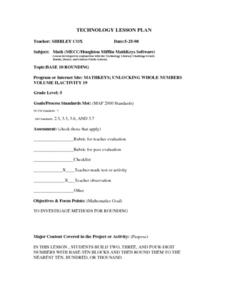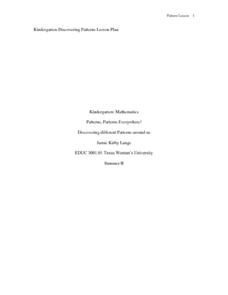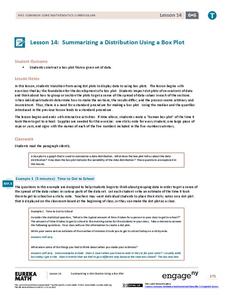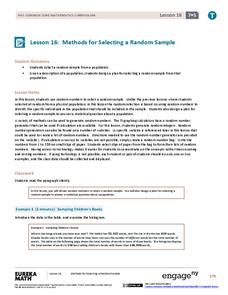Curated OER
NUMB3RS - Season 2 - "Convergence" - Air Hockey
Learn how to use a matrix to organize data to solve a problem. This activity uses wins and losses to rank players for an air hockey tournament they wish to have. After practicing some basic matrix operations the class could do the...
Illustrative Mathematics
Equivalent fractions approach to non-repeating decimals
Trying to get your class to think of decimals as fractions and vice versa can lead to interesting discussions. After all, we can usually understand quickly that 1/4 is .25 but why is 1/7 not so easy to convert? This activity looks...
National Math + Science Initative
Introduction to Decimals
Three activities make up an introductory lesson designed to create a strong foundation in comparing fractions to decimals and exploring and building decimal models. Pupils brainstorm and complete a Venn diagram to show how decimals and...
Federal Reserve Bank
Retirement Planning
It's never too early to start saving for retirement. In fact, the earlier one starts, the better! Use this retirement planning activity to teach the importance of a retirement strategy and why to start at a young age.
Curated OER
Story Problems - Math
Students participate in hands-on, computer activities to demonstrate the addition and subtraction of mathematical situations. Given a story problem, students determine when to add or subtract. Using word processing technology, students...
Curated OER
MathKeys Software "Unlocking Whole Numbers, Vol 2 (Rolling the Highest Number)"
Third graders arrange four numbers in order to make the highest number possible. In this place value lesson plan, 3rd graders practice working with four digit numbers on the computer and with base ten blocks.
Curated OER
Base 10 Rounding
Students build two, three, and four digit numbers using base ten blocks and round those numbers. In this rounding numbers lesson, students work in pairs and build numbers using base ten blocks.
Curated OER
Mystery Number
Students explore numbers 1-100. In this cross curriculum literacy and numeration instructional activity, students listen to the book More or Less by Stuart J. Murphy. Students play a game with a partner in which they guess the...
Curated OER
Number Chart and Number Line
First graders research strategies for identifying numbers through 100. In this number recognition lesson plan, 1st graders make games, create puzzles,and fill in missing numbers to practice number identification.
Curated OER
Number and Operations: Webbing Our Way Through Numbers
Second graders explore estimation and place value. For this place value lesson, 2nd graders estimate and construct numbers while working with spider activities. Students use addition and subtraction to compare estimates. Resources and...
Texas Woman’s University
Patterns, Patterns Everywhere!
Not only is pattern recognition an essential skill for young children to develop, it's also a lot of fun to teach! Over the course of this lesson, class members participate in shared readings, perform small group...
Curated OER
Color, Computers, and Math - Student Worksheet #2
In this color, computer and math worksheet, students practice converting from decimal values to hexadecimal values. They explore additive and emittive color blending.
Curated OER
Trading in Subtraction
Second graders solve two-digit subtraction problems without trades using counters and by modeling trades with base-ten blocks. They pair in groups and students open the "Counters Open Mat". Students are given a problem, such as: there...
Curated OER
Subtraction-There's Got to be An Easier Way!
Third graders observe and demonstrate a variety of problems involving subtraction problems using mental math strategies. They discuss the base ten system and the basic concept of subtraction, and complete a variety of activities...
Curated OER
Place Value and Rounding
Use rounding mountains and number lines to learn how to round numbers and learn place value. Learners will use a worksheet to help them round numbers. They will play a game called "Place Value Match-up" to help with skill practice. All...
Illustrative Mathematics
Accuracy of Carbon 14 Dating II
The scientific issue of carbon-14 dating and exponential decay gets a statistics-based treatment in this problem. The class starts with a basic investigation of carbon content, but then branches out to questions of accuracy and...
Digital Lesson
Cereal Box Surface Area
How much math can your learners pour out of a cereal box? Your middle schoolers will explore their favorite cereal and calculate the surface area, volume, and weight ratios and log this information on the provided worksheet. They get to...
Curated OER
Junk Yard Math
Third graders explore the process of place value and subtraction through regrouping and borrowing exercises. Several activities using manipulatives are utilized in the lesson.
Alabama Learning Exchange
Yummy Apples!
Young learners listen to a read aloud of Gail Gibbons book, Apples and the story A Red House With No Windows and No Doors. They compare characteristics of a number of kinds of apples, graph them and create a apple print picture. Learners...
EngageNY
Summarizing a Distribution Using a Box Plot
Place the data in a box. Pupils experiment with placing dividers within a data set and discover a need for a systematic method to group the data. The 14th instructional activity in a series of 22 outlines the procedure for making a...
Curated OER
Choral Counting I
Using a 100s chart or a number line with a pointer, work with your class to count up to 100 by ones and tens. As a part of daily instruction, prompt your kindergartners to chant count from 1 to 30. Move on to 1 to 50, and then from 1 to...
EngageNY
Methods for Selecting a Random Sample
Random sampling is as easy as choosing numbers. Teams use random numbers to create a sample of book lengths from a population of 150 books. The groups continue by developing a technique to create samples to compare from two populations...
National Science Teachers Association
Hop into Action
Young scientists find out what makes amphibians such unique and interesting animals in this simple life science lesson plan. After looking at pictures and discussing the characteristics of amphibians, learners complete a...
California Department of Education
I Have “M.I.” Strengths!
There are so many ways to be smart! Can your class identify their intelligences? The third of five career and college lesson plans designed for sixth graders challenges them to assess their unique skills. Once they determine their...























